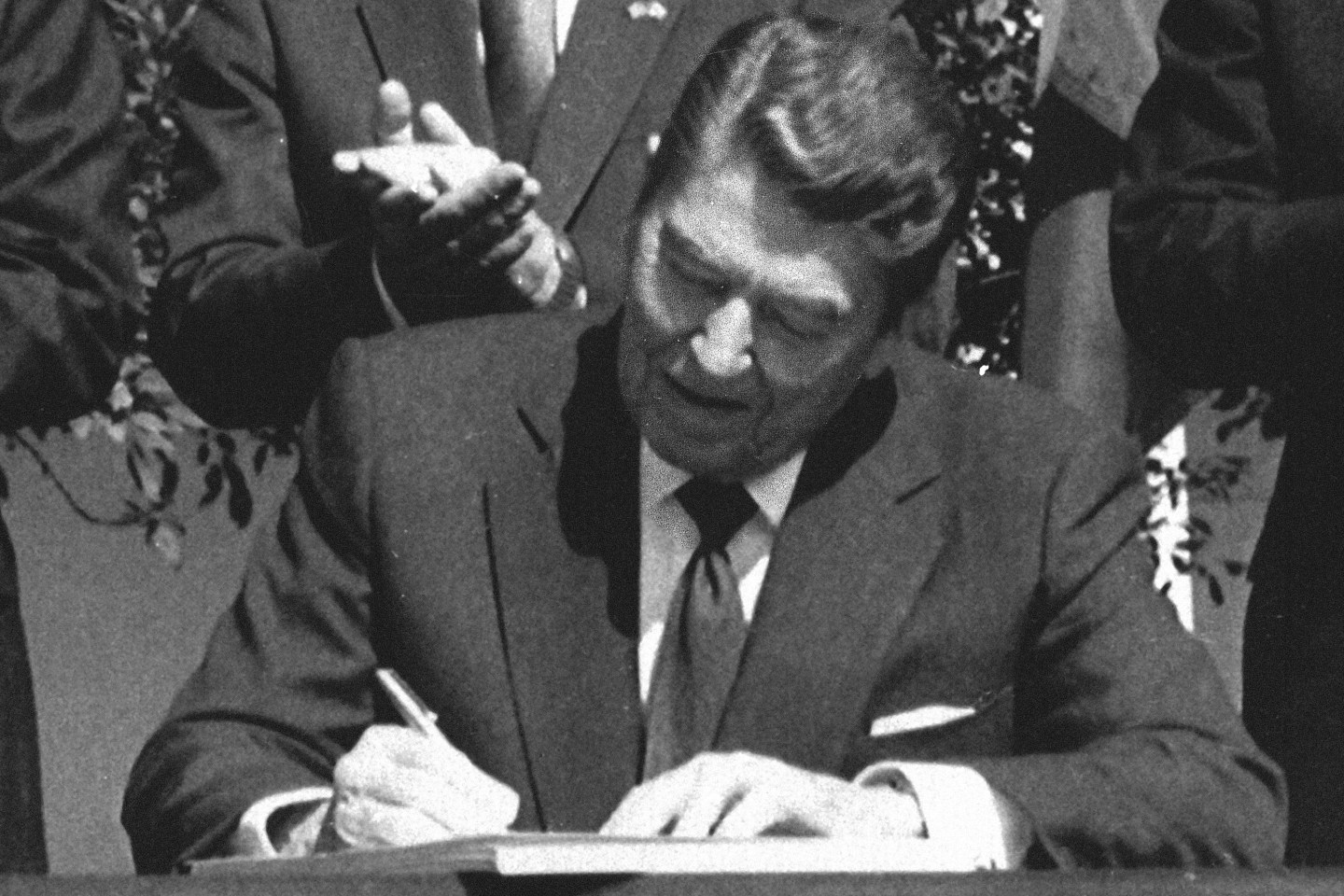The Ronald Reagan Presidential Foundation and Institute is drawing a volatile mix of blowback and praise for arguing that a Canadian government advertisement playing in U.S. Markets misrepresented the 40th president’s words to blast President Donald Trump’s tariff policies.
It is not clear how the California-based Reagan Foundation decided to enter the fray over the ad, which was purchased by Ontario Premier Doug Ford and used portions of a 1987 Reagan speech on trade in which he questioned the wisdom of using tariffs as economic policy. But shortly after the foundation said on social media that the ad misused “selective audio” of the former president, Trump cited the foundation when, in his own social media critique, he threatened to stop all trade with America’s northern neighbor and blasted the ad as unduly interfering in U.S. Politics.
The foundation statement seemingly aligned Reagan, a free-trade acolyte, with Trump, a protectionist who has flouted decades of U.S. Policy with high border taxes, including on goods from top U.S. Trading partners. The foundation, which helps support the Reagan Presidential Library & Museum, also suggested it could take legal action against Ontario’s provincial government, which sponsored the ad.
Reagan’s speech is included in millions of administration records governed by the Presidential Record Act signed in 1981 by his predecessor, President Jimmy Carter. That law puts presidential remarks in the public domain, meaning no one must seek permission from presidential foundations or libraries to redistribute them.
Ford said Friday that the ad would be phased out so the U.S. And Canadian administrations can resume trade talks. He said the ad had achieved its goal but would continue to air during the first two games of the World Series.
‘Easily intimidated by a call from the White House’
The backlash on social media was explosive, immediate and far from unanimous.
“Incredible cynicism and betrayal of Reagan by his own foundation,” Paul Novosad, a Dartmouth College economist, wrote on X. Novosad said anyone who followed the foundation’s advice to listen to Reagan’s full remarks “would see he says exactly what the Ontario ad claims.”
Jason Kenney, a former Canadian cabinet minister in a Conservative government, questioned the leadership of the Reagan Foundation on X. He said the entity had been “easily intimidated by a call from the White House, yet another sign of the hugely corrosive influence of Trump on the American conservative movement.”
Trump supporters countered on social media with echoes of the president’s assertions and accusations that Canada was meddling in U.S. Politics.
Foundation staff did not respond to Associated Press questions about how it has handled the matter. But one board member said in a brief interview that he knew nothing about the statement and had not been asked to participate in any deliberations ahead of its release.
“There may have been discussions about it, but I wasn’t a part of any of them,” Bradford Freeman, a private equity executive, told the AP.
White House press secretary Karoline Leavitt also did not immediately respond when asked via email whether the White House or anyone on the president’s behalf asked the Reagan Foundation to intervene.
Several other board members also did not reply to AP inquiries.
An atypical role for a presidential foundation
At the least, the developments represent an unusually tense application of the foundation’s typical mission, which is to buttress Reagan’s legacy. The situation also highlights the foundation as the latest U.S. Establishment institution to be drawn into the controversies of Trump’s aggressive second administration.
Trump previously has elicited policy concessions from multiple U.S. Universities, including elite public and private schools, after withholding or threatening to withhold federal funding. Presidents at Columbia University and the University of Virginia resigned as the Trump administration pressured their institutions.
Some U.S. Corporations voluntarily rolled back diversity initiatives. More recently, high-profile firms including Amazon, Apple, Coinbase, Comcast, Google, Lockheed Martin and Meta Platforms have agreed to help finance the ballroom Trump plans for the White House after ordering the building’s East Wing to be demolished. Many of those firms have regulatory business before Trump’s administration.
On Truth Social, Trump called the Canadian ad “fake,” despite the TV spot featuring clear audio excerpts from Reagan’s April 25, 1987, radio address.
“CANADA CHEATED AND GOT CAUGHT!!! They fraudulently took a big buy ad saying that Ronald Reagan did not like Tariffs, when actually he LOVED TARIFFS FOR OUR COUNTRY, AND ITS NATIONAL SECURITY,” he posted Friday.
Reagan used the radio address to explain why he was imposing targeted levies on some Japanese products as leverage in the countries’ trade dispute over computer chips.
That gives Trump and his backers a hook to argue that Reagan might not oppose at least some of the current president’s moves on trade. Yet Trump has imposed tariffs, often at unusually high rates, far more broadly than Reagan and other recent U.S. Administrations. And even while explaining his Japan policy, Reagan spent much of the 1987 speech – less than 10 minutes long – emphasizing that he remained an opponent of tariffs, a characterization the Ontario ad appeared to accurately represent.
Reagan’s speech affirmed his broad tariff opposition
“Throughout the world there’s a growing realization that the way to prosperity for all nations is rejecting protectionist legislation and promoting fair and free competition,” Reagan said.
He expounded:
“You see, at first, when someone says, ‘Let’s impose tariffs on foreign imports,’ it looks like they’re doing the patriotic thing by protecting American products and jobs. And sometimes for a short while it works — but only for a short time.
“What eventually occurs is: First, homegrown industries start relying on government protection in the form of high tariffs. They stop competing and stop making the innovative management and technological changes they need to succeed in world markets. And then, while all this is going on, something even worse occurs. High tariffs inevitably lead to retaliation by foreign countries and the triggering of fierce trade wars. The result is more and more tariffs, higher and higher trade barriers, and less and less competition.
“So, soon, because of the prices made artificially high by tariffs that subsidize inefficiency and poor management, people stop buying. Then the worst happens: Markets shrink and collapse; businesses and industries shut down; and millions of people lose their jobs.”
The Reagan foundation is a tax-exempt nonprofit that helps fund his library, which is part of the National Archives and Records Administration. As part of its tax-exempt status, the foundation is prohibited from endorsing political candidates and, generally, must be nonpartisan in its activities.
——
Barrow reported from Atlanta and Beaty from New York.












